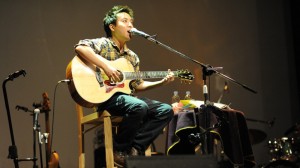David Choi believes music can change the world
Korean-American singer-songwriter David Choi is one of the most prolific and hardworking musicians of the YouTube generation. At age 26 he has released three studio albums, five singles, two all-covers albums, three songs for TV soundtracks, among others.
He has won two music competitions, one of which offered a car as grand prize, but he opted instead to get the cash equivalent so he could buy studio equipment.
He is said to have over 900,000 YouTube subscribers, whom he keeps constantly in touch with by posting videos and touring regularly.
On the day he arrived in Manila for a concert on May 17 at the Music Museum, Choi granted the Philippine Daily Inquirer an e-mail interview.
It is said that you had to take piano and violin lessons at a young age, and that you didn’t really enjoy them. How did you appreciate everything later on?
Later on, you realize that the foundation of music has been laid out through the practicing and lessons. It did help with certain aspects of songwriting and producing. I still hate practicing though!
Who was your first major musical influence and why?
I think classical music has had some sort of early musical influence because that’s what I listened to while growing up. But if you’re talking pop music, I really enjoyed stuff from the ’90s like Boyz II Men, Blink 182, Brian McKnight, Smash Mouth, and even some Japanese music like Chemistry and Matsu Takako.
How did you start writing songs and why did you decide to join a musical competition?
I started writing songs after I saw someone in high school who brought a CD playing music he had written. I went home that day and started composing on a keyboard that was lying around. One of the main competitions I entered was the John Lennon Songwriting contest for Teens and also the David Bowie Mashup Contest. I joined those to see if I had it in me to continue on this career path. It was also to prove to my parents that this was what I was supposed to do with my life.
Tell us about winning in those contests. Did you ever think that you had a knack for standing out in competitions?
For the David Bowie contest, I had to remix or “mash” two of his songs together to create a piece. To make a long story short, I won an Audi TT 2004 but I decided to take the cash instead to invest in studio equipment. For the John Lennon contest, it had a lyrical theme, “The American Dream.” I wrote some lyrics and was chosen by Usher as the winner. I got to meet him and posed in an issue of USA Weekend Magazine. As for having a knack for standing out, definitely not, because I have written some bad songs. But I would say that music is one of the only things in life I can do decently.
You worked as a staff writer/producer at Warner Chappell Music. Why did you quit and go back to being an indie musician?
Actually, I didn’t really quit. My contract ended so I decided to release an album since people had been asking for it for an entire year while I was signed as a writer. So technically, I was never really a performing artist. It wasn’t so much me choosing this career path, but more so it choosing me.
You also write music for TV, film and commercials which obviously pay well. It might be a contradiction, but is this how you sustain your freedom as an indie artist?
The pay is not very well, ha! A lot of it is no pay. I am able to sustain myself by living at home (I’m moving out soon), digital sales, touring, shows, merchandise, etc. All of it is necessary for me to keep doing this!
You have many followers on YouTube, which was also responsible for the discovery of Filipino singers like Arnel Pineda, Charice and AJ Rafael. What’s the most outrageous comment you have received for your videos?
Nothing is outrageous to me anymore. It’s the positive ones I find encouragement from — like the comments on how people have used my songs for their weddings, proposals, or even that my songs have prevented others from taking their own lives. I have learned that music is very powerful.
You use a lot of wit and humor in your music. Is this a natural trait of your personality, or did you just adapt it because it clicked with your fans?
I think it’s good to poke fun at life. I’ve always been like that.
Do you believe music can change the world in a long-term way?
Of course! That’s why music is here. It’s something we all need and that’s a special thing. Songs have started revolutions. Songs save lives. On the opposite end of the spectrum, it can also do bad things to people.
What is your greatest wish at this point in your career?
That people will continue listening to my songs and, hopefully, these songs will improve the quality of their lives!
